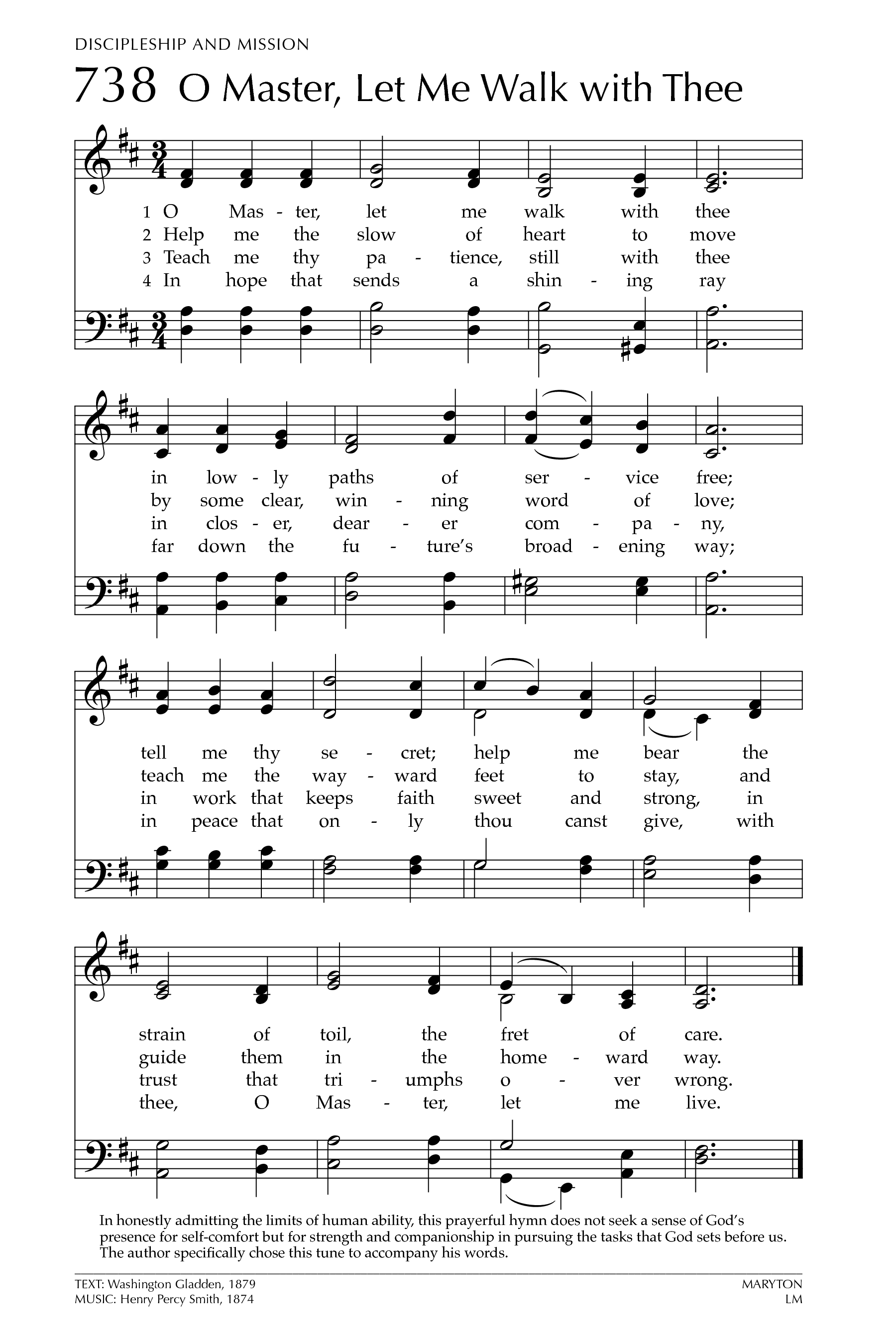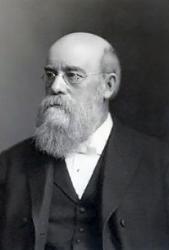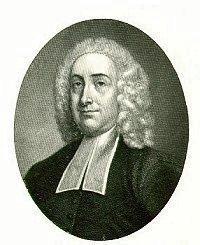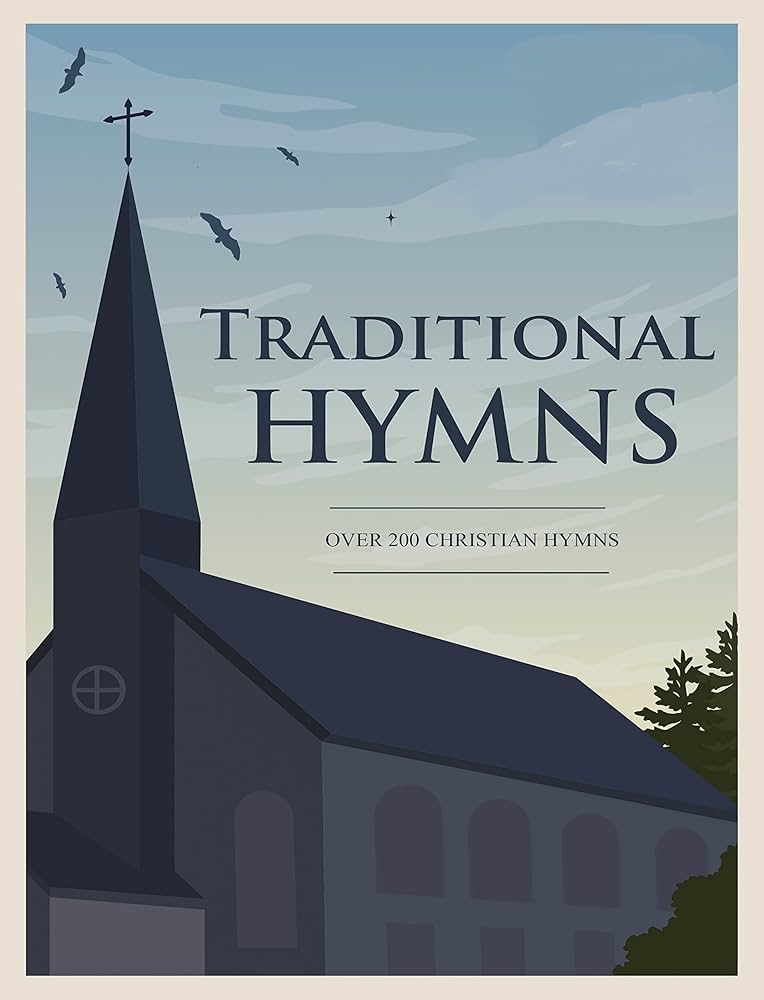O Master, Let Me Walk with The
Lyrics
In lowly paths of service free;
Tell me thy secret; help me bear
The strain of toil, the fret of care.
By some clear, winning word of love;
Teach me the wayward feet to stay,
And guide them in the homeward way.
In closer, dearer company,
In work that keeps faith sweet and strong,
In trust that triumphs over wrong:
Far down the future's broadening way;
In peace that only thou canst give,
With thee, O Master, let me live.
Bible Reference
Matthew 25:31-46
About This Hymn
Author – Washington Gladden, 1836–1918
Composer – H. Percy Smith, 1825–1898
Tune Name – Maryton
Meter – LM (88.88)
Scripture Reference – Matthew 25:31–46
Key Verse – He hath shewed thee, O man, what is good; and what doth the Lord require of thee, but to do justly, and to love mercy, and to walk humbly with thy God. – Micah 6:8
The beloved hymn “O Master, Let Me Walk with Thee”, first published in 1879, emerged from a significant period in American religious and social history. Following the Civil War, the United States was rapidly transitioning into an industrial power, a change that often brought with it social injustice and the exploitation of workers in the name of economic advancement. This environment gave rise to the “Social Gospel” movement—a religious response that sought to apply the teachings of Christ to address societal ills. One of the most prominent voices of this movement was Washington Gladden, a progressive clergyman whose legacy continues to resonate through this hymn.
Born on February 11, 1836, in Potts Grove, Pennsylvania, Gladden graduated from Williams College in 1859 and soon entered the Congregational ministry. While pastoring in the eastern United States for over a decade, he became an outspoken critic of political corruption, notably opposing the infamous Tweed Ring in New York. His activism contributed to the eventual imprisonment of the notorious Tammany Hall boss. In 1882, Gladden was called to serve at the First Congregational Church in Columbus, Ohio, a pastorate he would hold for the next 32 years. There, he became a leading voice in calling for the application of Christian principles to every sphere of life—social, political, and economic. He served as a mediator during national labor disputes, including the 1883 Telegraphers’ Strike and the 1884 Hocking Valley Coal Strike, always emphasizing the Church’s duty to uplift the masses spiritually, morally, and materially.
Despite his positive impact, Gladden’s views often drew fierce opposition. Business leaders and conservative church members criticized his stance on social justice and his rejection of uncritical acceptance of wealth in religious circles. He famously denounced a $100,000 gift from industrialist John D. Rockefeller, Sr. to the Congregational Church’s Foreign Missions Board, calling it “tainted money” due to Rockefeller’s unethical business practices. Furthermore, Gladden’s approach to biblical interpretation—which embraced modern scholarship and rejected inerrancy in favor of viewing the Bible as a profound religious book rather than a scientific or historical one—further alienated him from more traditional voices in his denomination.
Originally written not as a hymn but as a devotional poem titled “Walking with God,” the text first appeared in Sunday Afternoon, a religious periodical edited by Gladden. Later, when the piece was suggested for hymn use, the tune “Maryton”—composed by Anglican clergyman H. Percy Smith for the hymn “Sun of My Soul”—was selected and paired with Gladden’s words. The melody had first been published in Church Hymns with Tunes in 1874 and provided a dignified, contemplative setting for the hymn’s earnest plea for guidance and companionship with Christ. Although Gladden wrote many influential sermons and books, it is this simple yet profound hymn that has ensured his enduring place in Christian hymnody.
Interestingly, two of the original stanzas, often omitted in modern hymnals, reveal the inner struggles Gladden faced against his critics and detractors:
O Master, let me walk with Thee, before the taunting Pharisee;
Help me to bear the sting of spite, the hate of men who hide Thy light.
The sore distrust of souls sincere who cannot read Thy judgments clear,
The dullness of the multitude who dimly guess that Thou art good.
These lines reflect Gladden’s personal experience of rejection and misunderstanding, not only from secular society but also from within the religious community. Yet through this hymn, he expresses a steadfast commitment to walk humbly with God, echoing the call of Micah 6:8. “O Master, Let Me Walk with Thee” remains a moving prayer for service, humility, and faithful discipleship—a timeless message for every generation.


📬 Subscribe to Our Devotional Updates
Receive weekly hymns, devotionals, and website features directly in your inbox.
Recently Added Hymns
Hymn Information

- Category: Hymn
- Author/Writer: Washington Gladden (1879)
- Added: July 4, 2025
- Last Updated: July 4, 2025
- Views: 894
To view the author's biography, click their name above.
MIDI File
Popular Hymns
Recent Blog Posts
Popular Blog Posts
Visit Us on Social Media
Latest from X (Twitter)
Tweets by HymnalLibraryLatest from Facebook
Latest on YouTube
Daily Bible Verse
Disclaimer
The hymns, sheet music, MIDI files, and related content on this website are provided for educational and research purposes only.
- Public Domain: Many of the hymns featured here are in the public domain and may be freely used.
- Copyrighted Works: Some hymns may still be under copyright protection. Where applicable, permission has either been requested from the copyright owner, or the content is shared under the principles of fair use for educational purposes.
⚠️ Important Notice: If you wish to reproduce, distribute, or use any copyrighted hymn beyond personal study or educational use, you must obtain permission directly from the copyright holder. This website does not grant any rights for commercial use yet.
If there is any other question please address it to us in our Contact Page, for further assistance. Thank you for using the site. May God Bless You.












